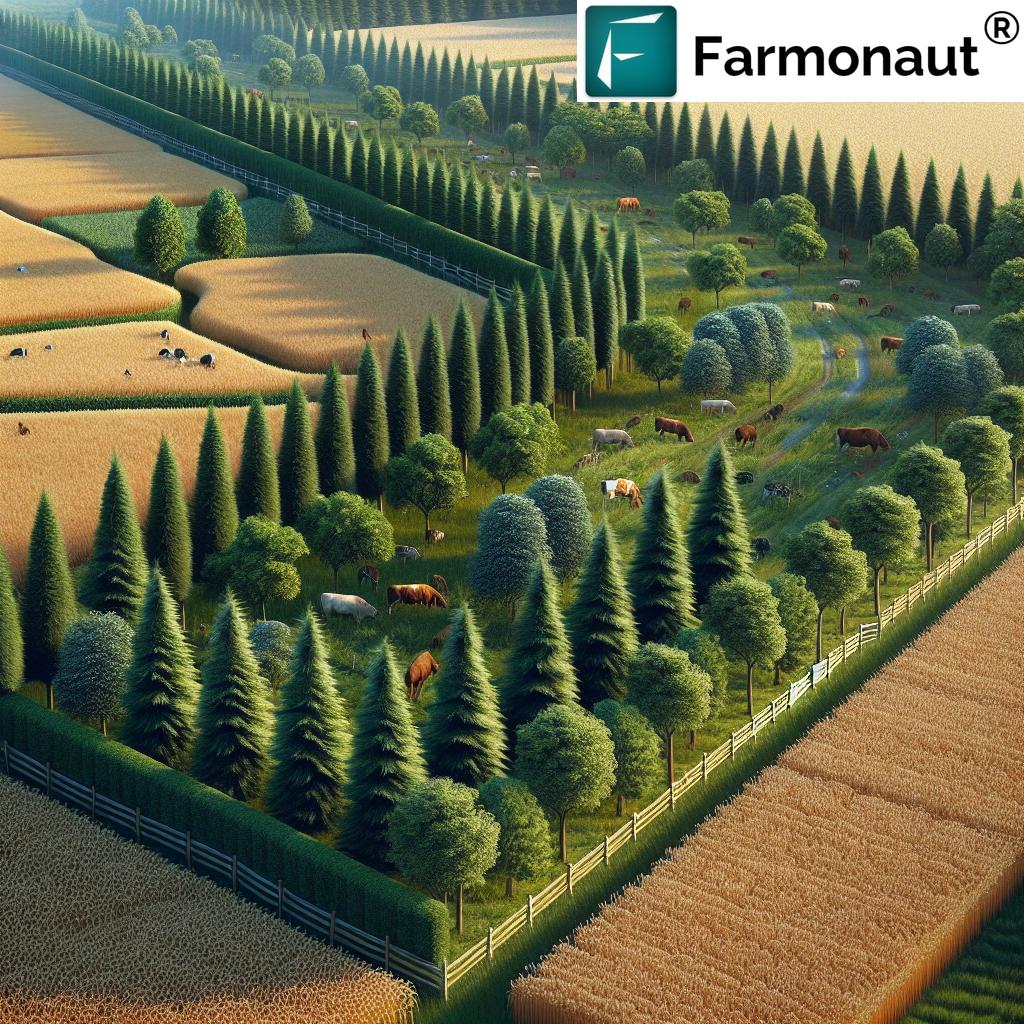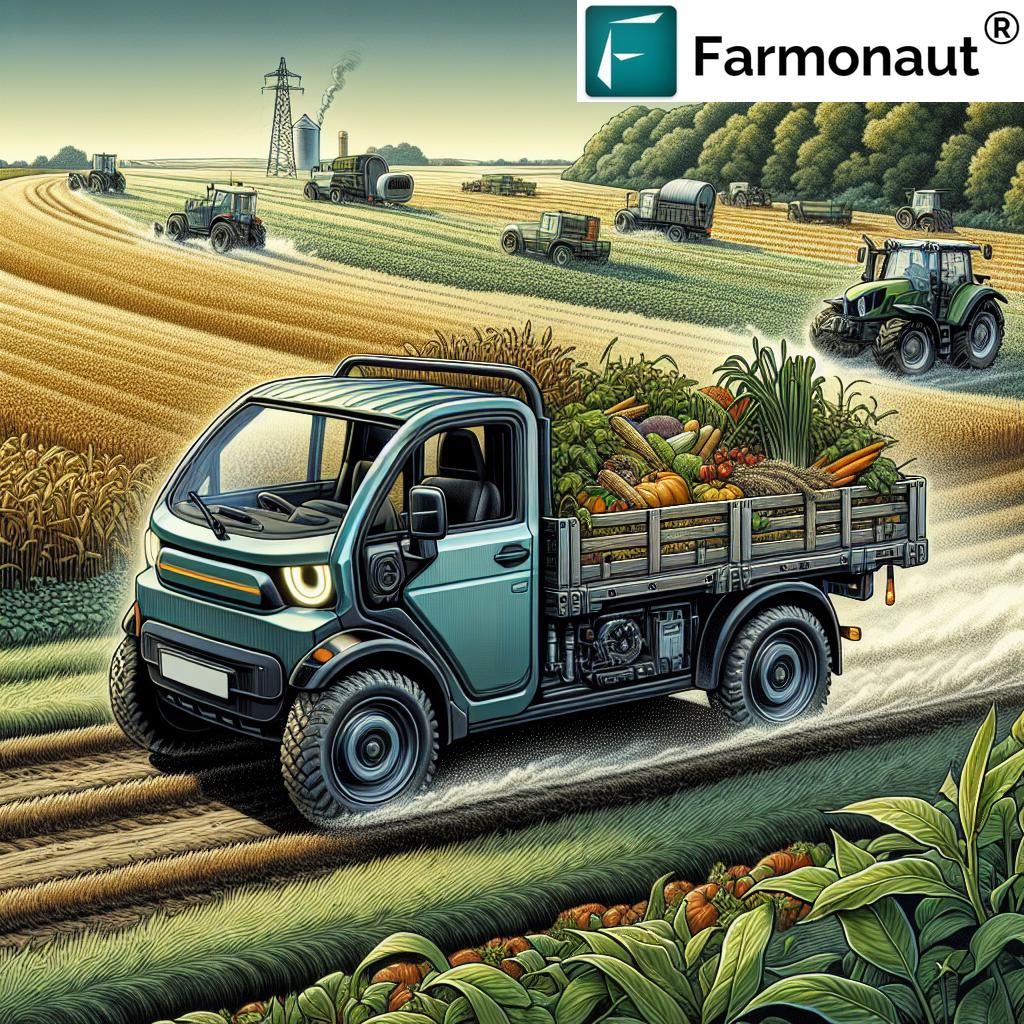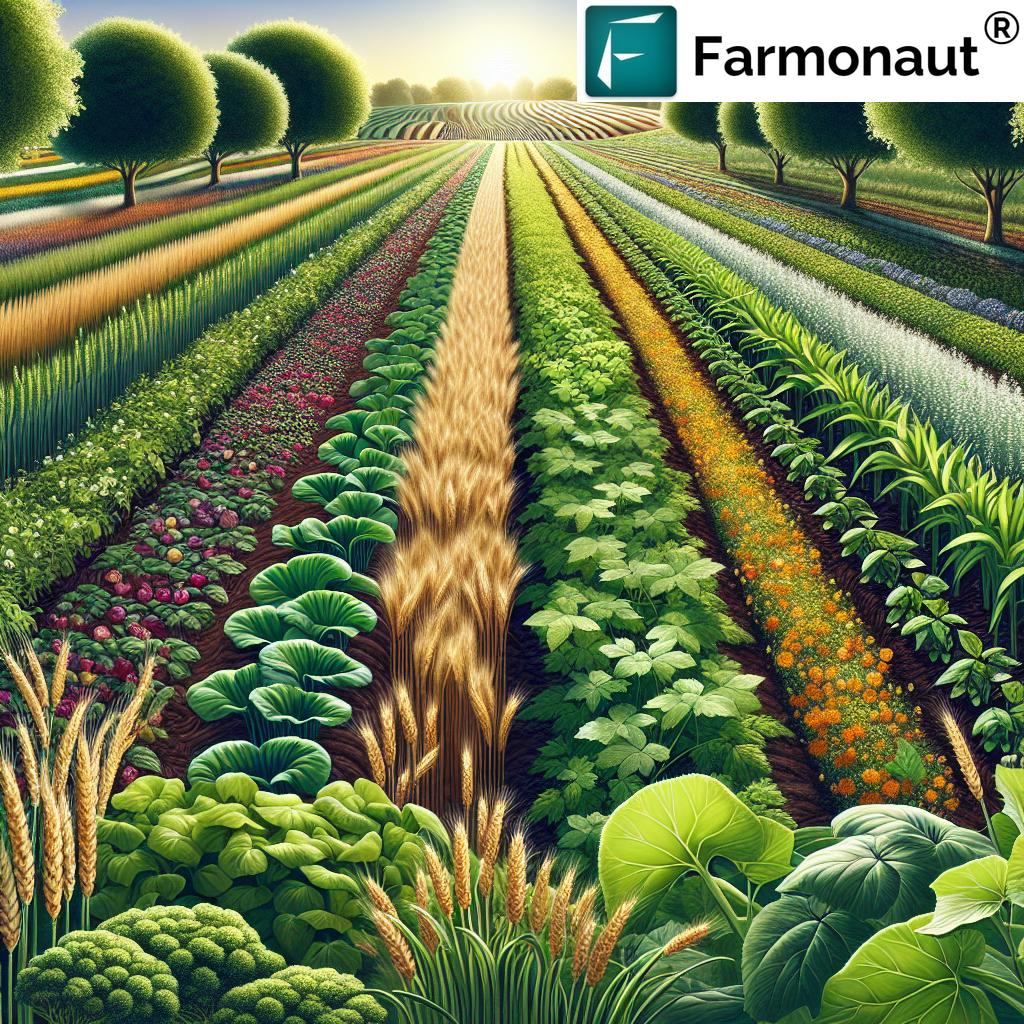Table of Contents
- Introduction: Why Choose a Sustainable Farm with Animals?
- The Importance of Farm Animals in Modern Agriculture
- Best Farm Animals for 2026: Easy, Common, and Profitable
- Comparison Table of Sustainable Farm Animals
- Small and Easy-to-Manage Farm Animals for Beginners
- Eco-Friendly and Sustainable Farming Practices with Animals
- Common Challenges for 2026 and Sustainable Solutions
- The Role of Farm Animals Beyond Production
- Looking Ahead: The Future of Farm Animals and Sustainable Agriculture
- How Farmonaut Supports Modern Farming with Animals
- Frequently Asked Questions
“Goats require 60% less grazing land than cows, making them a sustainable choice for small eco-friendly farms.”
Best Farm with Animals: Easy, Common Farmland Animals 2026
Focus Keyword: Best farm with animals
Meta Description: Explore the best farm animals and easy, sustainable practices for a thriving farm with animals in 2026. Enhance your agriculture, productivity, and environmental health with this comprehensive guide!
As the world’s demands for food continue to grow, sustainable farming remains central to securing our collective future. The role of animals in modern agriculture has shifted, focusing not just on production but also on environmental health, resource efficiency, and the overall wellbeing of farmland ecosystems. This comprehensive guide explores the best farm animals for 2026 and beyond, including small farm animals, easy farm animals, and common farmland animals that contribute to thriving and eco-friendly farms.
Whether you’re a new farmer starting out, an experienced agriculturalist aiming for greater sustainability, or simply exploring how farm animals can enhance your rural lifestyle, this blog dives deep into animal selection, management, eco-practices, and technology—specifically, satellite-driven solutions from Farmonaut. We’re committed to preserving the environment, optimizing productivity and security, and supporting farmers with the tools and data required to meet the challenges of 2026 and beyond.
The Importance of Farm Animals in Modern Agriculture
Farm animals are not just sources of meat, milk, eggs, and fiber; they are integral to farmland ecosystems, providing manure for fertilization, natural labor, and ecosystem services such as pest control and soil improvement. Over centuries, animals have played an integral role in supporting agriculture by:
- Providing essential nutrients through dairy, meat, and eggs
- Maintaining soil health by converting waste into fertilizer
- Controlling pests, weeds, and crop residues through grazing habits
- Supporting crop rotation and pasture management for resilient ecosystems
In contemporary farming, our focus has shifted toward selecting breeds and species that are more sustainable, resilient to disease, and adaptable to changing climates. The right farmland animals can be efficient at feed conversion and require minimal resources—aligning perfectly with the global push toward environmental stewardship.
Understanding which farm animals best suit your land—whether you aim for a small farm or a more diversified operation—is essential for optimized, sustainable agriculture.
Best Farm Animals for 2026: Easy, Common, and Profitable
Choosing the best farm animals in 2026 means considering profitability, low maintenance, adaptability, and how these animals contribute to the overarching goals of sustainability. Here we analyze the most common, easy-to-manage, and sustainable farm animals for small farms and diversified agricultural systems.
“Chickens can reduce farm waste by consuming up to 150 pounds of food scraps per year, supporting sustainability.”
Focus Keyword: Best farm animals
-
Chickens
- Ubiquitous, adaptable, and the top choice for small farm animals
- Provide eggs (daily production potential) and meat efficiently
- Require minimal space—perfect for suburban gardens or compact farmland
- Heritage breeds are increasingly popular in 2026 for their disease resistance, superior egg quality, and adaptability to local climates
- Feed requirements are low, and chickens can recycle food scraps into nutritious eggs
-
Goats
- Known for their hardiness and ability to thrive on marginal pastures
- Provide milk, meat, and fiber (cashmere, mohair); multi-purpose assets for any farm with animals
- Require much less grazing land than cattle, making them ideal for small farms with limited resources
- Efficient at converting diverse forage into nutrition
-
Sheep
- Valued for their wool, meat, and milk
- Breed varieties are tailored for specific climates and purposes; increasingly favored for sustainable agriculture
- Grazing habits help manage pasture health and control invasive plants
- Require moderate space and are generally easy to care for
-
Rabbits
- Easy to keep, requiring little space or specialized feed
- Ideal for small farm households seeking quick turnover of meat
- Their manure serves as excellent fertilizer
- High reproductive efficiency supports sustainable meat production
-
Ducks and Geese
- Efficient foragers and natural pest controllers, especially in rice or vegetable systems
- Eggs and meat offer diverse income streams, especially for diversified farms
- Require access to water—ideally suited for farms with wetland or pond resources
-
Cattle
- Large animals that can be resource-intensive—but certain breeds like Dexter or Miniature Hereford are suited to small farms
- Provide both milk and meat
- Help with grazing management and can contribute significantly to farm income
Key Criteria in Selecting Sustainable Farm Animals
- Efficient feed conversion: High output, low input
- Disease resistance: Suitable for minimal veterinary intervention
- Adaptability to local climates
- Low maintenance for beginners and small operators
- Multipurpose utility: Meat, milk, fiber, eggs, manure, pest control
- Contribution to soil health and overall ecosystem
Comparison Table of Sustainable Farm Animals (2026)
Small and Easy-to-Manage Farm Animals for Beginners
Focus Keyword: Easy farm animals
Not all farmers want or need a full-scale flock or herd. If your farm is small, or you’re just beginning, focusing on easy farm animals ensures a manageable workload while building vital farming skills. Here’s our recommended lineup for 2026 and beyond:
-
Chickens: Still the top choice—chickens are friendly, require little space, and their eggs can feed a family or generate steady income.

-
Rabbits: With minimal feed, efficient reproduction, and easy maintenance, rabbits are a great pick for fast meat production and excellent fertilizer through manure.

- Goats: While slightly more demanding than poultry or rabbits, goats are resilient, efficient at grazing, and suited for small farms. Their milk and fiber diversify farm outputs.
These small farm animals integrate well with crops, especially in permaculture and agroecological systems, contributing to weed control and waste recycling. Their low input needs and high returns make them essential for sustainable farms and first-time animal keepers.
Eco-Friendly and Sustainable Farming Practices with Animals
Focus Keyword: Sustainable farm with animals
Achieving a truly sustainable farm with animals means aligning animal welfare, soil health, and future productivity. The following eco-friendly practices are increasingly standard in 2026, boosting resilience and profit while preserving environmental quality:
-
Rotational Grazing: Moving animals between pastures ensures more even manure distribution, reduces disease build-up, prevents overgrazing, and maintains soil health by allowing grass recovery.
Goats, sheep, and cattle benefit the most from this system. - Multi-Species Grazing: Grazing combinations (e.g., sheep and cattle) can reduce disease transmission and maximize land productivity as different species eat different plants and target diverse pests.
- Manure Management: Collecting and composting manure for targeted field spread boosts soil fertility, supports soil biology, and recycles nutrients on-farm.
- Pest and Weed Control: Chickens, ducks, and geese help keep down insects and weeds, reducing the need for synthetic chemicals.
- Agroforestry Systems: Integrating small farm animals such as poultry or goats under trees or orchards can increase shade, limit erosion, and enhance biodiversity.
Adopting these practices helps farms contribute to broader sustainability goals, such as carbon sequestration, reducing water pollution, and supporting local food systems.
Track and improve your farm’s carbon footprint—learn more about Farmonaut’s Carbon Footprinting Solutions. Our satellite-driven monitoring helps farms measure, reduce, and balance emissions for greater sustainability in 2026 and beyond.
Common Challenges for 2026 and Sustainable Solutions
The path to a resilient farm with animals is not without hurdles. Farmers in 2026 face disease management, climate variability, rising feed costs, and accessing quality breeds. Here’s how modern agriculture tackles these challenges:
- Disease Management: Heritage breeds generally offer superior resistance. Advances in veterinary medicine, vaccination protocols, and robust biosecurity are essential for control.
- Climate Adaptation: Selecting animals suited to your climate and farm’s resources ensures long-term productivity. Goats and sheep are highly adaptable to both hot and cool environments.
- Access to Quality Breeds: Seek certified breeders, focus on local or regionally tailored breeds, and participate in farmer networks for better genetics.
- Technology for Monitoring and Efficiency: Smart sensors and AI-driven platforms (e.g., Farmonaut) can track animal health, detect unusual behaviors, and optimize feeding schedules. This precision reduces resource use and upfront costs.
For robust farm security in 2026, it’s imperative to future-proof operations with technology and knowledge:
- Install automated waterers and feeders
- Use rotational systems to limit parasite build-up
- Adopt digital tools for herd/flock management—calendars, medication logs, and recordkeeping apps
Ensure your agricultural investments are protected—explore Farmonaut’s Crop Loan and Insurance Services. Satellite-based monitoring and verification can streamline insurance and financing for agricultural and livestock operations.
The Role of Farm Animals Beyond Production
Farm animals are more than meat, milk, and fiber. Their grazing habits help manage pasture health, control unwanted vegetation, reduce wildfire risks by keeping grass low, and support on-farm biodiversity. Integrating livestock and cropping creates a resilient ecosystem where each part contributes to the system’s vitality.
- Soil Improvement: Manure and urine restore vital nutrients to the soil, supporting microbes and enhancing the capacity of crops to thrive.
- Pest and Weed Control: Chickens, ducks, geese, and even sheep can naturally manage weeds and pests—limiting pesticide dependency.
- Manure Fertilization: Manure is a cost-effective, organic fertilizer that closes nutrient loops and reduces farm reliance on synthetic inputs.
- Landscape Maintenance: Cattle and goats control brush, opening up new grazing areas while reducing disease-prone, overgrown zones.
This “whole farm” mindset—where animals, crops, and natural cycles interact—proves essential for long-term agricultural productivity, food security, and ecological health.
Unlock transparency and enhance product value—discover Farmonaut’s Traceability Solutions using blockchain. From farm to table, ensure every stage of your animal and crop production is traceable, secure, and trustworthy.
Looking Ahead: The Future of Farm Animals and Sustainable Agriculture
As we enter 2026 and beyond, the landscape of animal agriculture is evolving. With growing consumer demand for locally produced, ethically raised, and environmentally responsible products, small farm animals and diversified systems are set to flourish.
- Breeds adapted for low-input, eco-friendly systems will continue to gain favor for their resilience and resource efficiency.
- Integrated farming—combining crops, livestock, and forestry—will underpin productive, sustainable rural economies.
- Technological advancements such as AI-advisory tools, precision health monitoring, and satellite imagery (offered by companies like Farmonaut) will make modern farming more precise, productive, and sustainable.
- Younger and first-generation farmers will find opportunities in niche markets by raising rare breeds, offering value-added products, and adopting digital technologies to improve efficiency and environmental impact.
Manage your farm at scale with Farmonaut’s Large Scale Farm Management Tools. Our platform features real-time monitoring, AI-based advisory, and operational dashboards for tracking animal and crop health across complex farm operations.
How Farmonaut Supports Modern Farming with Animals
To build a sustainable farm with animals, access to reliable, real-time data is crucial. We (Farmonaut) offer a comprehensive platform to support farmers and agricultural businesses:
- Satellite-Based Monitoring: Receive multispectral imagery to monitor soil conditions, pasture health, grazing patterns, and identify areas for improvement—without the need for expensive hardware.
- Jeevn AI Advisory System: Get real-time animal and crop insights, weather forecasts, and data-driven advice personalized to your farm’s needs.
- Environmental Impact Tracking: Monitor carbon footprint, track manure management, and comply with sustainability regulations.
- Blockchain Traceability: Build trust in your animal products with transparent, secure records—meeting the demands of 2026’s food markets.
- Fleet and Logistic Management: Optimize the use of farm vehicles and assets, reducing both costs and environmental impact.
You can access Farmonaut’s tools through our

, or use the

and

apps for mobile use. For developers and businesses, our API is available at sat.farmonaut.com/api with detailed developer documentation.
Why Choose Farmonaut?
- Affordable satellite-driven solutions for farmers of all scales
- No specialized equipment needed—control and monitor via web or phone
- Enhances productivity with AI-advisory and actionable insights
- Supports sustainability through environmental impact monitoring
- Increases transparency in animal-origin food systems
- Improves access to financing for livestock and mixed farms
For scalable solutions, try our Agro Admin App—tailored for large-scale and diversified farms seeking next-level animal and crop management.
Frequently Asked Questions (FAQ)
What are the best farm animals for small, sustainable farms in 2026?
Chickens (meat and eggs), goats (milk, meat, and fiber), sheep (wool and grazing), rabbits (quick meat production), ducks, and geese (foraging and pest control) top the list. These animals require minimal space, are adaptable to various climates, and contribute to soil health and sustainability.
How do animals contribute to soil health and sustainable farming?
Manure from farm animals acts as natural fertilizer, enriching the soil with nutrients. Grazing animals help control weeds, recycle nutrients, and, in rotational systems, promote pasture growth and diversity—all essential for long-term farm productivity.
Are there eco-friendly farm animals ideal for beginners?
Yes. Chickens and rabbits are considered the easiest farm animals for beginners. They require minimal space and special equipment, adapting well to small farms or backyards. Goats are also beginner-friendly, especially for those interested in milk production and grazing.
What are the most common challenges in animal farming for 2026, and how can they be solved?
Key challenges include disease management, climate adaptation, feed costs, and breed availability. Solutions involve choosing resilient breeds, leveraging technology (satellite monitoring, AI advisory), implementing rotational grazing, and seeking local, certified breed stock.
How can I use technology to boost my farm’s sustainability with animals?
Platforms like Farmonaut offer satellite-based monitoring, real-time insights, and environmental impact tracking, enabling farmers to efficiently manage resources, optimize animal welfare, monitor grazing impact, reduce costs, and ensure compliance with sustainability standards.
Conclusion: Building the Best Farm with Animals for 2026 and Beyond
The future of farming is sustainable, resilient, and technology-driven. By choosing the best farm animals for your land—like chickens, goats, sheep, rabbits, ducks, and geese—and embracing eco-friendly practices such as rotational grazing and integrated management, you can ensure both productivity and environmental stewardship.
Innovative platforms like Farmonaut empower farmers with affordable satellite-tracking, AI-advisory, and blockchain transparency tools to tackle contemporary challenges. With precise data, actionable recommendations, and transparent traceability, farms can drive profitability, environmental health, and food security for local and global communities alike.
Start your journey toward a thriving, resilient, and modern farm with animals using technology and sustainability-first practices.
Try out Farmonaut today on

or download our app on

/

to see how satellite and AI can transform your farm, animal management, and sustainability!
If you’re interested in integrating animals for soil health and sustainability at any scale, Farmonaut’s crop, plantation, and forest advisory can help with science-driven decisions from planting to pasture management.








